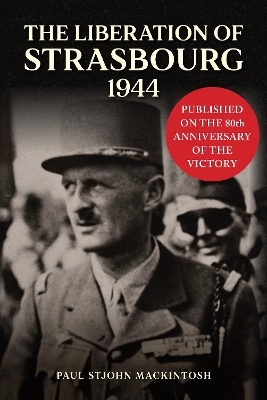
The Liberation of Strasbourg 1944
Seiten
2024
Amberley Publishing (Verlag)
978-1-3981-2355-7 (ISBN)
Amberley Publishing (Verlag)
978-1-3981-2355-7 (ISBN)
A neglected passage of World War II history, when French forces liberated this trophy city in the aftermath of a Nazi collapse, only to almost lose it again in the Battle of the Bulge. De Gaulle described the liberation of Strasbourg “one of the most brilliant episodes in our military history.” But who did the fighting?
The occupation and liberation of Strasbourg was described by de Gaulle as ‘one of the most brilliant episodes in our military history’, yet is overshadowed outside France by the Battle of the Bulge. France’s equivalent to Douglas MacArthur’s oath ‘I shall return,’ General Philippe Leclerc’s Oath of Kufra, ‘not to lay down our arms until our colours, our beautiful colours, fly over Strasbourg Cathedral’, guided his celebrated 2nd Armoured Division across France from Normandy to the Rhine, until in November 1944 he recaptured Strasbourg in a daring feat of arms.
Strasbourg was menaced as soon as it was liberated, as Hitler sought in the wake of the Ardennes Offensive to recapture this coveted trophy. SHAEF was on the verge of abandoning the city to Nazi vengeance until an eleventh-hour meeting between de Gaulle, Churchill and Eisenhower reversed the decision and sent French and American forces to defend it. The defenders – including recruits from France’s colonies – sacrificed themselves heroically. After this bloody victory, Strasbourg’s liberators and defenders crossed the Rhine to occupy Germany, sharing honours with 101st Airborne’s Band of Brothers in Hagenau and the Eagle’s Nest.
The author explores the history behind the Franco-German rivalry over this polyglot city, its loss, its insanely unbalanced Nazi occupation, its liberation by the Free French forces, and its defence against Hitler’s vengeance. It also looks at the neglected contribution of France’s multi-ethnic colonial soldiers to the salvation of the city and the country, and Strasbourg’s modern role as an icon of restored European harmony and unity.
The occupation and liberation of Strasbourg was described by de Gaulle as ‘one of the most brilliant episodes in our military history’, yet is overshadowed outside France by the Battle of the Bulge. France’s equivalent to Douglas MacArthur’s oath ‘I shall return,’ General Philippe Leclerc’s Oath of Kufra, ‘not to lay down our arms until our colours, our beautiful colours, fly over Strasbourg Cathedral’, guided his celebrated 2nd Armoured Division across France from Normandy to the Rhine, until in November 1944 he recaptured Strasbourg in a daring feat of arms.
Strasbourg was menaced as soon as it was liberated, as Hitler sought in the wake of the Ardennes Offensive to recapture this coveted trophy. SHAEF was on the verge of abandoning the city to Nazi vengeance until an eleventh-hour meeting between de Gaulle, Churchill and Eisenhower reversed the decision and sent French and American forces to defend it. The defenders – including recruits from France’s colonies – sacrificed themselves heroically. After this bloody victory, Strasbourg’s liberators and defenders crossed the Rhine to occupy Germany, sharing honours with 101st Airborne’s Band of Brothers in Hagenau and the Eagle’s Nest.
The author explores the history behind the Franco-German rivalry over this polyglot city, its loss, its insanely unbalanced Nazi occupation, its liberation by the Free French forces, and its defence against Hitler’s vengeance. It also looks at the neglected contribution of France’s multi-ethnic colonial soldiers to the salvation of the city and the country, and Strasbourg’s modern role as an icon of restored European harmony and unity.
Paul StJohn Mackintosh is a British author and editor living in France. He has contributed extensively to historical reference works such as 'The Plantagenet Encyclopedia', and to the 'Los Angeles Review of Books', ''Teleread', 'Financial Times', the UK 'Independent', the 'Times Literary Supplement', and other periodicals and websites.
| Erscheinungsdatum | 20.11.2024 |
|---|---|
| Zusatzinfo | 16 Plates, color |
| Verlagsort | Chalford |
| Sprache | englisch |
| Maße | 156 x 234 mm |
| Gewicht | 625 g |
| Themenwelt | Geschichte ► Allgemeine Geschichte ► Neuzeit (bis 1918) |
| Geschichte ► Allgemeine Geschichte ► 1918 bis 1945 | |
| Geschichte ► Teilgebiete der Geschichte ► Militärgeschichte | |
| ISBN-10 | 1-3981-2355-2 / 1398123552 |
| ISBN-13 | 978-1-3981-2355-7 / 9781398123557 |
| Zustand | Neuware |
| Haben Sie eine Frage zum Produkt? |
Mehr entdecken
aus dem Bereich
aus dem Bereich
Europa 1848/49 und der Kampf für eine neue Welt
Buch | Hardcover (2023)
DVA (Verlag)
48,00 €
Giordano Bruno - ein ketzerisches Leben
Buch | Hardcover (2024)
C.H.Beck (Verlag)
29,90 €


